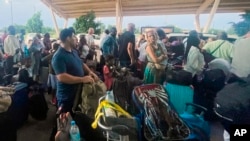Military chiefs from the Economic Community of West African States (ECOWAS) arrived Wednesday in the Nigerian capital, Abuja, for two days of meetings to discuss last week’s coup in Niger. Meanwhile, the United States joined several European nations in evacuating their nationals.
ECOWAS said in a brief statement that the Committee of Chiefs of Defense Staff would discuss the "political situation in the Republic of Niger" in their meetings through Friday. ECOWAS has set a deadline of Sunday for President Mohamed Bazoum’s return to power. Otherwise, it will consider the use of force.
"The military option is the very last option on the table, the last resort, but we have to prepare for the eventuality," said Abdel-Fatau Musah, ECOWAS commissioner for political affairs, peace and security.
"There is a need to demonstrate that we cannot only bark but can bite," he told reporters Wednesday in Abuja.
ECOWAS also sent a delegation Wednesday to Niger’s capital, Niamey, for talks with junta members.
ECOWAS also has imposed sanctions on Niger that include cutting energy transmissions to impoverished country of 25 million people, which imports nearly all of its electricity. Neighboring Nigeria has since stopped sending electricity to Niger, but it is unclear how much of Niger’s electricity that represents.
General Abdourahamane Tchiani, who declared himself the new head of state, said in a televised address that the junta "rejects these sanctions altogether and refuses to give into any threats, wherever they come from. We refuse any interference in the internal affairs of Niger."
Meanwhile, the U.S. State Department said Wednesday it is ordering the "temporary departure of non-emergency U.S. government personnel and eligible family members from the U.S. Embassy in Niamey." It also raised its travel advisory to Level 4 – Do Not Travel – for Niger.
France’s military and foreign ministry continued Wednesday to evacuate people from Niger. The foreign ministry said about 1,000 people have left Niger on four flights. The evacuees included French nationals along with people from Niger, Portugal, Belgium, Ethiopia, Lebanon, Germany, Canada, India, Austria and the United States.
Italian Foreign Minister Antonio Tajani shared a photo of an Italian air force plane that he said landed early Wednesday with Italians who left Niger. Spain also said it planned an evacuation flight for its nationals.
Military leaders put Bazoum under house arrest on July 26 and named Tchiani, commander of the presidential guard, as their new leader on Monday. Coup leaders said they were acting in response to what they described as a worsening security situation and the government's lack of action against jihadis.
The coup has been condemned by Western countries, including the U.S., which says it stands with Nigeriens, ECOWAS and the African Union as it continues to work to roll back the coup, U.S. officials say.
U.S. Secretary of State Antony Blinken spoke by telephone Wednesday with Bazoum to discuss the situation in Niger, the State Department said.
Spokesperson Matthew Miller said in a statement about the call that the United States "remains committed to the restoration of the democratically-elected government" in Niger.
"We reiterate that the safety and security of President Bazoum and his family are paramount," Miller said. "The United States is dedicated to finding a peaceful resolution that ensures that Niger remains a strong partner in security and development in the region."
Some information for this report came from The Associated Press, Agence France-Presse and Reuters.





